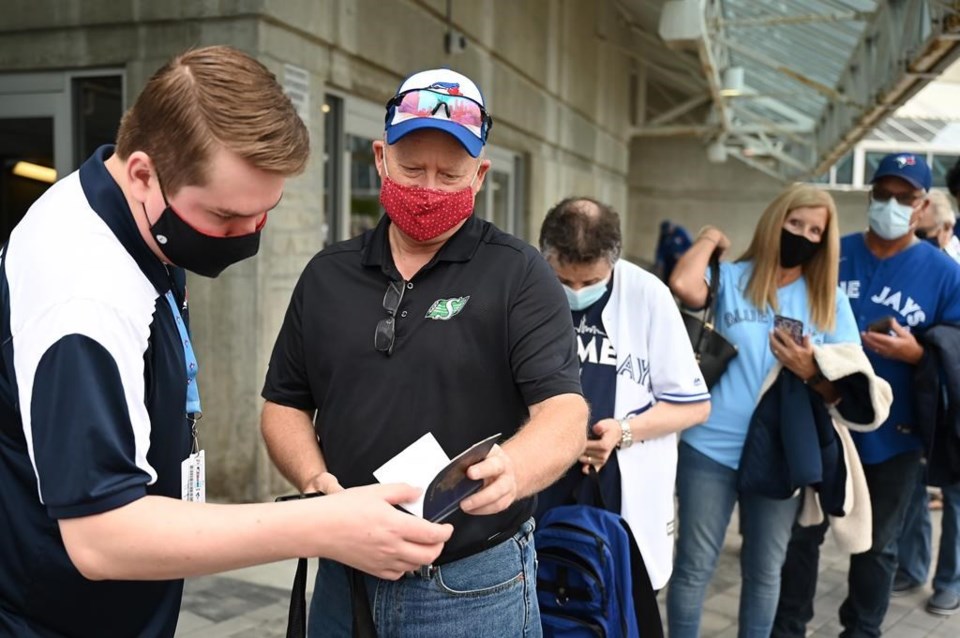TORONTO — Ontario businesses enforcing the province's COVID-19 vaccine certificate system won't have to verify medical exemptions, the government said Tuesday, acknowledging the system was vulnerable to fraud.
The system takes effect on Wednesday next week, requiring patrons to show proof of full vaccination and a piece of ID to enter settings that include restaurants, theatres and gyms. Businesses and customers can be fined for non-compliance.
While businesses will need to ensure the name and date of birth on a patron's vaccination receipt match those on an identification document, the venues will not need to validate any medical exemption notes presented.
The government acknowledged the system was open to abuse as the Opposition and business groups raised concerns over what they identified as loopholes.
"There may be some situations where people don't have valid medical exemptions. However, we expect that they will be few and far between," Health Minister Christine Elliott said as the province detailed guidelines for the policy.
Dr. Kieran Moore, the province's top doctor, said there are very few approved medical exemptions to vaccination. He said medical professionals who abuse the system may be disciplined, and customers who use fraudulent medical notes may also be penalized.
The province also said a standardized note for exemptions was being developed for medical professionals to issue.
Elliott said the province is allowing medical exemptions under the certificate system so that people with legitimate reasons for not getting immunized can still have access to spaces where proof of vaccination will be required.
The system will initially require patrons to show a paper or digital receipt of vaccination along with a form of government-issued identification. On Oct. 22, the province aims to launch a QR code and verification app for businesses to streamline the process.
Elliott said the QR code and app would help reduce the risk of fraudulent exemptions. But people can keep using paper records if they choose to.
Retail stores and services considered "essential," like grocery stores, are exempt. There are also exemptions for people entering an establishment to use a washroom, to pay for or pick up an order, to access an outdoor area not covered by the policy, or to purchase admission tickets. The system also doesn't apply to venue staff.
People under age 12 who can't be vaccinated are also exempt, as are people under 18 entering facilities for organized sports.
NDP Leader Andrea Horwath said the government's guidelines don't address the system's loopholes.
"It continues to be full of exemptions and it's pretty confusing," Horwath said.
Provincial enforcement officers will start visiting businesses this week to discuss the new system, the government said.
Businesses are instructed to contact law enforcement about harassment or threats over the policy.
"If (at) any point they feel threatened, we want them to call 911 as soon as possible," Elliott said, adding that it's up to police forces to decide how to ready themselves for the system's implementation.
The government said all provincial offences officers – including bylaw, police and public health inspectors – can provide education on the system and issue fines related to it.
Dan Kelly, CEO of the Canadian Federation of Independent Business, raised concerns that businesses are being asked to become "the vaccine police" without being given additional resources to do so.
"I struggle to believe that this will be anything other than loosely enforced," Kelly said in an interview. "There's just not the capacity."
He noted that conflicts have already arisen in businesses over mask mandates, which are easier to assess than proof of vaccination or complicated medical exemption forms that could be forged.
"Who's going to sign up for the job to be the screener ... that's going to have to tell the unhappy, unvaccinated customer that they're not allowed to enter?" Kelly said.
The Ontario Chamber of Commerce welcomed the provincial guidance but still had concerns.
Rocco Rossi, the chamber's president, said businesses want vaccination guidelines for employers, legal protections for businesses in the event of lawsuits, and funding for resources needed to enforce the rules, such as hiring more staff.
The head of the Registered Nurses' Association of Ontario said she expects the vaccine certificate system will be effective even if it's not perfect, though she was "puzzled" by the exemptions for staff and loose enforcement of medical exemptions.
"Hopefully, these loopholes, if we start to see them becoming bigger, maybe we will close them," Doris Grinspun said.
The province said first doses of COVID-19 vaccines increased by nearly 30 per cent the week after it announced the vaccine certificate plan.
Also on Tuesday, the province announced it would offer third COVID-19 doses to more people with specific health conditions, following guidance from a national immunization committee.
People undergoing treatment for tumours, more transplant recipients, people with Stage 3 or advanced HIV and others undergoing immunosuppressive therapies are now eligible to receive a third dose to boost their immunity to the virus.
Ontario reported 577 new cases of COVID-19 Tuesday and six more deaths linked to the virus.
This report by The Canadian Press was first published Sept. 14, 2021.
Holly McKenzie-Sutter, The Canadian Press

